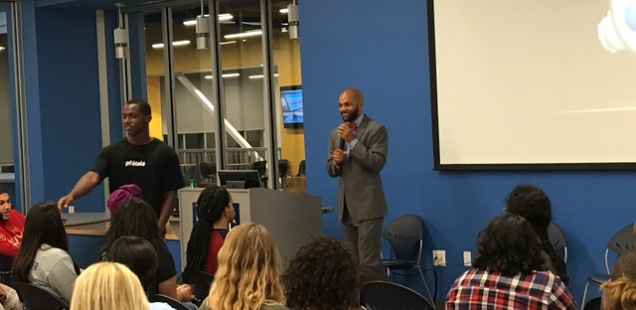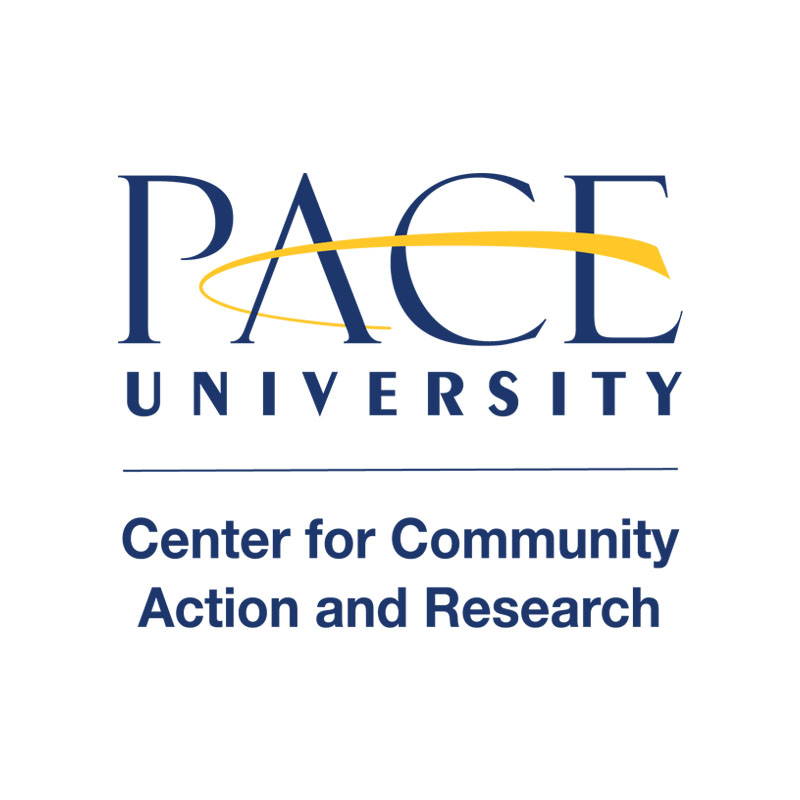
A Report From the Charlottesville, Race, and Pace Event
Wednesday night, in the Multipurpose Room of the Kessel Student Center on Pace University’s Pleasantville campus, students and faculty alike came together to participate in a discussion on the events that unfolded in Charlottesville, race, and how that affects the Pace community.
Leading the discussion was Cornell Craig, Director of Multicultural Affairs and Diversity Programs, alongside Malcolm Reynolds, Vice President of Unity and Social Justice in the Student Government Association.
They began by showing a clip from NBC News, where former Ku Klux Klan member David Duke explained how the rally in Charlottesville would help “fulfill [the] promises of Donald Trump.”
The murmurs and head shaking of the audience members were enough to understand how everyone felt without having to participate in any discussion yet.
Protests took place in Charlottesville on a Friday night in mid-August. Torch-wielding protesters marched through the night chanting things like, “You will not replace us!” The white supremacists gathered in a surprise protest before Saturday’s Unite the Right Rally. The activities of Friday night proved to be the catalyst to a sequence of events for the next 24 hours no one would expect.
Pausing the conversation once more, Craig played a Vice News video on why tearing down Confederate Monuments is going to be harder than many may think. With so many monuments, streets, and even elementary schools named after Confederate General Robert E. Lee alone, it may take more than just pulling down a statue to get rid of his legacy.
At the end of the second video, on display was a graph entitled “Confederate Iconography Came Long After the Civil War.” While the graph title seems fairly self-explanatory, Craig went on to explain that the statue of Robert E. Lee was erected in 1924 when the Civil War ended in 1865. This elicited even more shaking heads than the first video did, as well as some looks of shock for those who had never known this fact before.
At the mention of Confederate iconography, the event took a turn toward discussion. Dr. Durahn Taylor, Associate Professor of History in the Dyson College of Arts and Sciences, began the discussion with a point that made people think.
“There are two types of climate change we need to be concerned about,” said Dr. Taylor, “Just like physical climate change, what does this [graph] indicate? The rise and fall of monuments? If we’re concerned about our future, what do we do about racial, social, and ethnic climate change? Just because [the issues have seemed to lessen] doesn’t mean they’re over.”
Craig reiterated this point to the crowd saying, “Just because [things got better over time], doesn’t mean everything went away from history.” He also brought up the point that at no other time in American history were their monuments built to honour losses or those who have resisted or challenged authority. What makes it okay to do so with the Confederacy?
Craig proceeded to open the floor even more to students in attendance who wanted to share how they were feeling about the happenings in Charlottesville. The first to take the mic was Rachel Skopp-Cardillo, a sophomore on the Pleasantville campus.
“I was 30 miles away from everything when it happened,” she began. With five close friends on campus for Resident Assistant training during the protests, Skopp-Cardillo couldn’t help but feel scared. One of her friends was standing on the same street where Heather Heyer was killed by a car that plowed into a crowd at the protests.
“For me, it was very emotional to see the hate there,” Skopp-Cardillo continued, “Charlottesville is a place where people are so nice and never forget you…so this really hit home.”
After Skopp-Cardillo’s emotional testimony about Charlottesville and her experiences in connection to the protests, things took a more political turn. A point was made that the recent presidential election made people feel comfortable “showing their true colors because the leader of the country is a racist.”
An audience member sparked the inevitable politics side of the conversation saying, “People are apologizing because they got caught, not because of what they’re doing.”
Rachel Carpenter, the Director of Student Development and Campus Activities, took it a step further saying, “Racism stems from power: power dynamic, power over someone else. When you’re used to having power and now you don’t, [it’s] interesting what the result in behaviour is.”
Craig added to this with his own spin on the infamous quote that has been floating around for decades: “When you grow in the presence of privilege, equality feels like oppression.”
Heather Novak, Associate Director of CCAR, summed up the whole issue succinctly when she said, “As people make progress, people who feel that they are losing something lash out against that not realizing that people who are gaining something is not their loss.”
The idea of the President’s rhetoric being a problem came up and was instantly met with agreement in the form of nodding heads and murmurs between audience members.
Sophomore Lindita Kulla immediately spoke out against how the President addressed the Charlottesville protests when he said that there was bad on both sides. “Only one person died and we know who’s side it was on,” she said.
Then, Craig posed an interesting question to the audience. One that they did not seem to expect. “What does Make America Great Again mean to you?”
Whether he caught everyone off guard or this is something people had given a lot of previous thought to, multiple hands shot up in the air, ready to share what this very controversial statement meant to them.
Even Reynolds chimed into the conversation to answer this question, saying, “When you talk about [Make America Great Again], it means they want to return to a lifestyle of oppression during slavery. Not implying that they were great to begin with.”
Carpenter responded in a way that truly resonated with the audience. “When I hear Make America Great Again, only two words come to mind: ‘For who?’”
Taylor Williams, a sophomore on the Pleasantville campus, shared a post-election anecdote about a conversation she had with her mother. The morning after President Trump was elected, her mother called her, almost in tears, and told her to made sure that she got her education no matter what because, at that point, “it’s the only thing that people cannot take [away from] you.”
The story left audience members, including myself, with goosebumps. It can be easy to distance ourselves from these things and have feelings about situations but when they hit so close to home, we soon find that they are impossible to avoid. It no longer becomes anyone else’s job to fix it; it becomes our job.
Craig touched upon this point and opened up the conversation on what we can do by saying, “People get complacent and say, ‘What am I supposed to do?’ You have power. The first step to being powerless is believing that the power can be taken from you.”
Novak added, “You can’t expect somebody to do for you what you can do for yourself.”
It all begins with educating yourself and taking the proper steps to take action. Registering to vote is a huge proponent of change that people fail to take into account.
Students can be walked through the voter registration process with CCAR, and the Center will even mail out the forms for students. There will be a ‘Meet the Candidates’ event in October where students can learn about who is running in the upcoming local elections. The event is open to everyone but in order to vote in these elections, voters must be registered by Oct. 14.
Tyler Kalahar, Program Coordinator for CCAR, said, “A way to keep people down is to keep them away from voting.”
“When you don’t participate, their [white supremacists] voices are louder,” added Professor Novak.
Craig closed with this: “The worst part of racism is what you don’t see. It’s a silent killer. We each have to do a better job in our community of identifying and honing out and challenging racism, homophobia, sexism, [and others] in any way we can.”
The first step to making any change is educating yourself. Take classes outside of your major course. Utilize your resources on campus. Learn about local government. Step outside of your own bubble.
Remember, change is a marathon, not a sprint.
Written Kamari Stewart
Member of the Marketing and Outreach Committee within the Center for Community Action & Research







